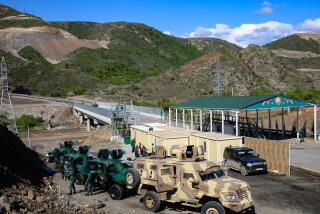Baker, Shevardnadze Debate Arms Control; Both Sides Optimistic : Diplomacy: They wrestle with problems for 5 hours. And they deal with religion on a monastery tour.
- Share via
MOSCOW — Secretary of State James A. Baker III and Soviet Foreign Minister Eduard A. Shevardnadze met for almost five hours Thursday without removing the final obstacles to an arms control treaty, but ranking officials on both sides expressed optimism that agreement could be reached before the superpower summit meeting starts May 30.
“There are gaps between us,” a senior State Department official said after Baker and Shevardnadze quit for the night shortly before 10 Moscow time.
“In every single area, they are meeting,” he said. “They met all day. . . . If the gaps were unbridgeable, they would not be meeting.”
“The problems are there,” said Arkady A. Maslennikov, President Mikhail S. Gorbachev’s press secretary. “They are not insurmountable, but they are very difficult.”
Baker and Shevardnadze hope to complete preparations this week for the May 30-June 3 summit meeting in Washington between President Bush and Gorbachev.
The two men began their formal talks about 5 p.m. after teams of arms control experts had wrestled with the issue for most of the day. While the specialists worked, the foreign ministers toured the 14th-Century Trinity-St. Sergius monastery, a picturesque compound of onion-dome churches that is the historic heart of the Russian Orthodox religion. The monastery is in Zagorsk, 44 miles northeast of Moscow.
A senior State Department official said Baker was “moved” that Shevardnadze had picked the Christian shrine as the destination for their only foray out of Moscow.
Archbishop Alexander, who served as host at the monastery, assured Baker that religion is making a comeback in the still officially atheistic Soviet Union.
But if Shevardnadze’s objective was to persuade Baker that the days of repression of religion are past, some of the impact was lost when the two men stopped to visit the tiny village of Radonezh on the way back to Moscow.
When the motorcade of four Zil limousines and a dozen or so other cars stopped in front of the village church, an elderly woman wearing a dirty brown shawl hurried up to the visitors to complain that the church had been converted to a museum and was not open for worship.
When Baker asked how long the church had been closed, the woman replied, “Since the war.”
Her voice rising with emotion, the woman, who said she is 76 but who did not give her name, pointed beyond the village and said that “over there they opened the church, but ours is still closed.”
Later, Baker was approached by another woman who complained, “We have no place to pray.”
When someone asked her what would happen to the museum if the church were reopened, she replied, “Just move the museum.”
In response, Shevardnadze said to Baker in a loud voice: “Let’s agree that the governments of the Soviet Union and the United States promise and pledge that the church will be reopened.”
When Baker arrived here Tuesday, U.S. officials said the major unresolved arms control issues concerned cruise missiles, both sea-launched and air-launched. When Baker was asked Thursday if he had heard anything new from the Soviet side on the subject, he replied, “Not a lot.”
However, Gennady I. Gerasimov, spokesman for the Soviet Foreign Ministry, told reporters at midday that the two nations “have narrowed their positions” during the latest round of talks.
Maslennikov said it should be relatively easy to settle the dispute about air-launched cruise missiles because it is a straightforward matter of numbers. Washington wants missiles with a range of less than 620 miles to be exempt from the treaty while Moscow wants to put the range limit at 370 miles.
But the Soviet presidential spokesman said the controversy about sea-launched missiles is more difficult. The United States wants to leave that category of weapons outside the treaty with each side making a “parallel, politically binding declaration” of the maximum number they plan to deploy. U.S. officials say Moscow agreed to that approach last February but later backed away from what Washington considered a done deal.
On other topics, a senior U.S. official said Baker and Shevardnadze are close to agreeing on a common approach to the situation in Afghanistan, once a major source of friction between the two nations.
The official said the talks are focusing on ways to bring about elections for a new government to replace the Soviet-backed regime of President Najibullah.
“There is clearly a pathway here, from our standpoint, toward a political settlement,” he said.
The official also said Shevardnadze told Baker near the end of Thursday’s meeting that he wanted to talk today about Soviet Jewish emigration “in the Middle East context,” a clear reference to the complaint by Arab governments that Soviet Jews are being settled in the Israeli-occupied West Bank and Gaza Strip.
Soviet officials promised Egyptian President Hosni Mubarak, who completed a visit to Moscow earlier this week, that they would suggest that the United States resettle more Soviet Jewish emigres to ease the pressure for housing them in the West Bank and Gaza Strip.
More to Read
Sign up for Essential California
The most important California stories and recommendations in your inbox every morning.
You may occasionally receive promotional content from the Los Angeles Times.













